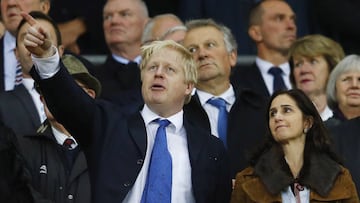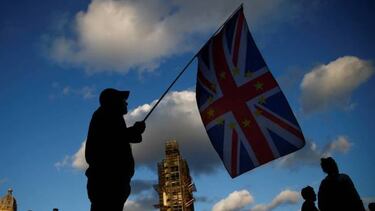Johnson election victory heralds shake-up for sport
The UK general election on Thursday gave the Conservatives a resounding majority, allowing them to proceed with Brexit which is likely to have major consequences for sport.

The majority achieved by the Conservative party in the UK general elections held on 12 December means Prime Minister Boris Johnson will be able to plough ahead with his Brexit plans, with the UK set to leave the European Union on 31 January, when the last extension agreed comes to an end.
The process is likely to have major consequences for sport, both in the UK and on the continent, although many of the effects are as yet unknown, with the final trade deal between the UK and the EU still to be negotiated. The Conservatives have said they will get the deal done within a year, however many experts consider that wildly optimistic, meaning there is still a chance the UK could end up with no final agreement with the EU.
Football in Johnson's court
Once Brexit is completed, EU national footballers will have no automatic rights to live and work in the UK, although it is expected that those already plying their trade will be able to carry on as normal without any change to their status.
Those that wish to come and play in the UK will presumably have to apply through the new Australia-style points system, which the Conservatives have said they will us to govern immigration in the future. It’s likely that high-wage earning footballers would satisfy the requirements, but less certain that up and coming young footballers would be so easily accepted.
What’s also not certain is how the FA will treat these players, who will now become fully foreign. Currently the English governing body requires that non-EU players must be internationally established at the highest level (defined as coming from one of the top 10 nations in the world under the FIFA rankings and having taken part in 30% of matches played by their country). If this rule is extended to all EU players this would dramatically cut the number of players able to play in the Premier League. According to sources consulted by this newspaper, up to 65% of foreign players might leave the league under this scenario.
The Premier League itself has argued against this measure being applied, stating that there is no evidence that shows that having fewer foreign players arriving leads to better skilled domestic players, despite there being more opportunities for them to play.
In general teams, the FA’s position will be supported by the new Tory government, which is seeking a hard Brexit, while the Premier League, the English Football League (which governs the lower leagues in England) and the Scottish Premiership are all united in seeking a laxer environment for signing and employing players from overseas.
Brexit will almost certainly affect youth football, particularly for players aged between 16 and 18. Currently under EU rules these players can take advantage of freedom of movement to travel to or from the UK to further their careers outside their home countries. However after Brexit the standard FIFA rules preventing under 18s from moving abroad will apply. A prime example of this was Cesc Fàbregas who moved from Barcelona’s La Masia to Arsenal when he was 16, or Jadon Sancho’s move to Borussia Dortmund.
While the future remains uncertain for the movement of players to and from the EU to the UK and vice versa, the final impact will depend on the deal the British Prime Minister strikes with the remainder of the bloc. On 31 January, however, there is likely to be no change to the status of most players, and it won’t be until the summer when we see if fears over the future have an impact on the transfer of players in and out of the UK.
There is not expected to be any impact on the 2020 European Championships, although players and fans will have to meet any new entry requirements imposed by the UK government ahead of the tournament, with the semi-finals and final due to be staged at Wembley Stadium.

Formula 1: "The mother of all catastrophes"
In the world of motorsports, Formula 1 could find itself the worst-affected party due to the presence in the UK of six of the 10 teams currently competing - Mercedes (Brackley and Brixworth), Renault (Enstone), McLaren (Woking), Red Bull (Milton Keynes), Racing Point (Silverstone), Williams (Grove) and Haas (Banbury).
The F1-specific economy could also suffer as a consequence of Brexit: it takes 20,000 separate components to build a Formula 1 car and changes to import-export regulations could have a detrimental effect on the whole industry.
Honda also has a base of operations in Milton Keynes and Pirelli, the famous tyre manufacturer, operates out of Slough, although the actual production of tyres takes place in Turkey and Romania and the design process is carried out in Milan.

Related stories
In total, it is estimated that 6,500 people are directly employed in F1, with 4,200 based in the UK, according to figures from racefans.net.
Mercedes Team Principal and CEO Toto Wolff has previously described the effects of Brexit on Formula 1 as the “mother of all catastrophes” for the sport.